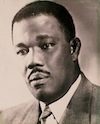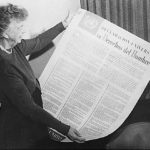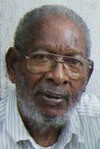December 10th is Human Rights Day. A topic that is top of mind and heart as we read the news and face shared realities around the world.
The Universal Declaration of Human Rights was the result of having experienced the atrocities of the Second World War and vowing to never again have this happen. Haiti was a founding member of the United Nations on October 24, 1945 with Senator Emile Saint-Lot, a founding father of Le Flambeau Foundation , playing a key role as the founding and first UN Ambassador for Haiti.
World leaders decided to complement the UN Charter with The Universal Declaration of Human Rights aimed at guaranteeing the rights of every individual everywhere.
 Senator Emile Saint-Lot from Haiti was a co-signatory who, along with U.S. First Lady Eleanor Roosevelt,
Senator Emile Saint-Lot from Haiti was a co-signatory who, along with U.S. First Lady Eleanor Roosevelt, and many other countries, adopted the Universal Declaration of Human Rights on December 10, 1948. Senator Emile Saint-Lot is a founding father of Le Flambeau Foundation . To read the Universal Declaration of Human Rights (click here)
and many other countries, adopted the Universal Declaration of Human Rights on December 10, 1948. Senator Emile Saint-Lot is a founding father of Le Flambeau Foundation . To read the Universal Declaration of Human Rights (click here)
.
Discussions past and present have taken place on this topic. Following are highlights.
Declaration of Human Rights  (by Dr. Luc L. Colas, December 10, 1998 – Cap-Haitien, Haiti)
(by Dr. Luc L. Colas, December 10, 1998 – Cap-Haitien, Haiti)
Human Rights Youth Perspective – Hernice
Senator Emile Saint-Lot became a signatory to the Constitution of Haiti. Senator Emile Saint-Lot later was also a signatory to the historic Declaration of Human Rights in Paris with U.S. First Lady Eleanor Roosevelt. Ambassador Emile Saint-Lot throughout his life, seemed to want us to listen Read more
The universal declaration of human rights, 10 December 1948, talks about civil rights, political rights, social rights, and cultural rights, has thirty (30) articles. It has been written because there was many and different conflicts, either wars or popular revendications in the world, often theses conflicts were reaction of inhuman treatment and injustice. Today, we can say and see how things change Read more Human Rights Perspective – Jean
The Universal Declaration of Human Rights plays an important role in the functioning of the world. The conditions of its preparation already show the importance it requires. In fact, it was written after the First World War in December 10, 1948 in Paris by the United Nations. With its 30 articles, the declaration aims to prevent the world from falling into the atrocity of two world wars known in the space of half a century, and in particular it aims to prevent the renewal of fate that the Nazis reserved to their Read More



